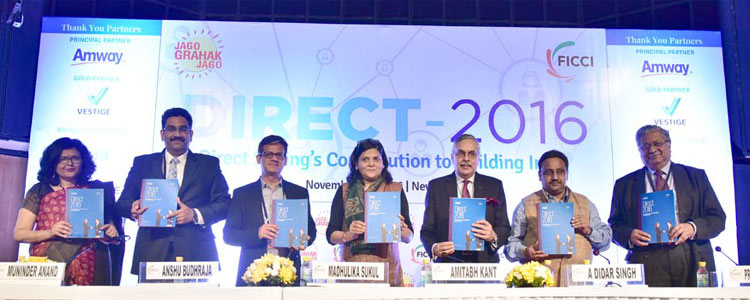
FICCI‐KPMG Report‐ 2016 – ‘’The contribution of Direct Selling to Building India’’

Mr. Amitabh Kant, Chief Executive Officer, NITI Aayog said that direct selling will have to be given a great thrust as it empowers women, MSMEs and promotes manufacturing in India, at FICCI DIRECT 2016, annual flagship event for DS industry.
Mr. Kant applauded the efforts of the Ministry of Consumer Affairs to come up with the guidelines to govern the direct selling industry and is hopeful for its implementation by various states. He added that an effective and time bound implementation of the guidelines would act as a growth stimulator for the budding DS industry.
He also urged the industry to embrace technology as the industry can deliver better and even faster once technology becomes its strength. He congratulated the direct selling industry for the efforts that they are putting in towards building the national economy and said that the sector is a major contributor towards the Indian growth story and promised to support the industry in addressing the hindrances and bottlenecks in due course of time. Also, he added that there is a huge opportunity that the industry raises in terms of pushing India towards the digital age.
Ms Madhulika P Sukul, Additional Secretary, MoCA released FICCI‐KPMG Report‐ 2016 – ‘’The contribution of Direct Selling to Building India.’’
During her keynote address Ms Madhulika P Sukul, Additional Secretary, MoCA quoted that she delighted to see the contribution of the sector towards women empowerment and the figures of more than 60% women workforce associated with the sector has been astounding. Ms. Sukul urged the industry to join hands with MoCA and work towards the effective implementation of the guidelines for the sector that the ministry has come up with. The Additional Secretary promised that MoCA would continue to work towards the welfare of the consumers with active industry support and encouragement.
Further Mr. Anshu Budhraja, GM, Amway India Enterprises presented the industry perspective and said the sector has immense potential in terms of the workforce that it trains and the job opportunities it generates. Mr. Budhraja said that the industry needs to work as per the Gold Standards, of which self-governance is a core concept. He congratulated MoCA for coming out with the much awaited guidelines for the sector and said that the guidelines would help in adding further value to the growth path of the industry. Mr. Anshu Budhraja quoted, “by 2025 the industry is expected to grow to ₹ 72000 crore from ₹ 7200 crore in 2016 providing 1.8 million self-employment opportunity.”
Mr Praveen Khandelwal, General Secretary, CAIT, emphasised on the need of having a retail policy that will encompass the cross sectorial approach and would help in adding avenues of growth for the sector. He said that there is a need to convert the guidelines proposed for the DS sector into laws towards which the Government is working relentlessly. Also, Mr. Khandelwal quoted that the passing of Consumer Protection Bill in the parliament would add more flavours to the development of the sector by reducing the mischief and Ponzi operators. He also said that a board of internal trade that would look upon the matters associated with the internal trade and retail sector should be formulated with adequate representation from all the concerned stakeholders from the industry as well as the Government. Mr. Khandelwal quoted that retail, direct selling, e-commerce and SME’s are the four core pillars for the development of the national economy.
Further on the occasion, Dr. A Didar Singh, Secretary General, FICCI said “Indian Direct Selling Industry is an important component of the Indian economy and acknowledging this, we at FICCI through our focused task force on direct selling is working dedicatedly towards the growth of this industry and seeking regulatory clarity for this new industry. FICCI is working closely with the Central and State Governments on the same and today’s conference is a step in that direction. I would like to congratulate MoCA for implementing the much awaited guidelines to govern the sector. I am certain that the effective enactment of the same would facilitate the further growth of the sector and act as a growth catalyst.
Today, we have launched the FICCI‐KPMG report on the contribution of Direct Selling industry towards building the national economy and its contribution towards the flagship programs of the Indian Government. This would be a reservoir of information on how this industry is contributing towards the development of various facets of the Indian economy’.’
Dr. Singh said that Industry 4.0, or Industrie 4.0, is the current trend of automation and data exchange in manufacturing technologies. It includes cyber-physical systems, the Internet of things and cloud computing. Industry 4.0 creates what has been called a “smart factory” and urged the industry leaders to adhere to same. Dr. Singh also added that the bussing direct selling industry is exceptionally gender friendly and has been a crucial part of women empowerment.
Direct selling, one of the oldest and traditional forms of selling, is today a successful industry operating in over 100 countries, with a market size of USD180 billion. In India, the market was estimated at INR75 billion (2013‐14), and forms around 0.4 percent of the total retail sales in the country. To showcase the potential and highlight the opportunities and challenges faced by the DS industry, FICCI organizes its annual event on Direct Selling ‘DIRECT’ every year. Inter‐Ministerial committee (IMC) on Direct Selling IMC formed under the aegis of MoCA has been working relentlessly towards enabling the growth of the sector through several policy reforms and advocacies. FICCI is fortunate to be the knowledge partner for the IMC for developing regulatory structure for this industry.
The event witnessed intense panel discussions on the topics ‘’Way Forward Post Direct Selling Guidelines’’ and ‘’Direct Selling Contribution in Skilling, Women Entrepreneurship & As Food Distributors’’ which comprised of representation from wide array of concerned stakeholders including the Government and the industry.
The panels suggested an effective implementation of the guidelines by the states in a time bound manner would yield wonders for the sector and would be an asset to it’s growth trajectory. Also, the sessions highlighted how the direct selling has evolved as a core pillar of the Skill India campaign and trains significant amount of workforce and makes them job ready. Also, the contribution of the DS sector towards the empowerment of women has been significant and the phenomenal number of 62% women workforce involved in the sector is remarkable.
In continuation with Direct 2015, this year’s summit has scaled up to new heights. It is unprecedented to have such a cohesive voice of all regional, sectoral and National associations working for this sector to gather at one platform. The confidence is displayed in the sheer footfall of more than 500 delegates at this year’s conference.
This year’s KPMG report to be released at Direct 2016 on Nov 30th, takes a look at how the Direct Selling industry has positively contributed to several flagship schemes launched by the Government of India in the past 2 years, namely:
- Skill India: The Skill India scheme seeks to provide the institutional capacity to train a minimum of 400 million people by 2022. The Direct Selling industry annually trains over 5 million people in marketing and communication skills, personality development and leadership skills.
- Make in India: Many Direct Selling companies now make in India. Some rely on MSMEs for manufacturing their products, investing in & providing the right equipment and machines to the MSMEs for production. Driven by these initiatives, several MSMEs have now developed capabilities to cater to the needs of other MNCs and have commenced supplying to them, in the process promoting the Make in India initiative
- Women Empowerment: Due to the dominance of women centric products offered under Direct Selling, the industry provides self-employment opportunities to a large number of women. In 2015 alone it has provided self-employment to over 3 million female distributors. By providing income generation opportunities and trainings, Direct Selling promotes holistic development of women.
- Digital India: The Direct Selling industry is adopting measures in the digital sphere that not only benefit the Direct Selling entities, but also ensure ease of doing business for its distributors and improved experiences for its end consumers. Mobile applications and websites have been launched by Direct Selling companies for its distributors to order products, monitor payments and access training modules.
- Startup India: Direct Selling entities, are now catering to global FMCG clients. Direct Selling has also promoted startups in avenues such as transportation and logistics, trainings, app development, etc.
According to the report, the industry has recorded high double digit growth of about 16 per cent over the past four to five years. The market has grown to become a key channel for distribution of goods and services in the country, especially for health and wellness products, cosmetics, consumer durables, water purifiers and vacuum cleaners.
